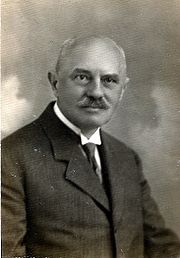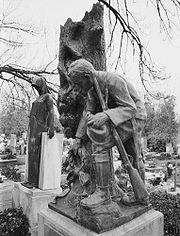
Károly Bund
Encyclopedia

Environmentalist
An environmentalist broadly supports the goals of the environmental movement, "a political and ethical movement that seeks to improve and protect the quality of the natural environment through changes to environmentally harmful human activities"...
, serving as executive secretary of Hungary's National Forestry
Forestry
Forestry is the interdisciplinary profession embracing the science, art, and craft of creating, managing, using, and conserving forests and associated resources in a sustainable manner to meet desired goals, needs, and values for human benefit. Forestry is practiced in plantations and natural stands...
Association (Országos Erdészeti Egyesület) from 1900 until his death. He was born in Besztercebánya, Austria-Hungary
Austria-Hungary
Austria-Hungary , more formally known as the Kingdoms and Lands Represented in the Imperial Council and the Lands of the Holy Hungarian Crown of Saint Stephen, was a constitutional monarchic union between the crowns of the Austrian Empire and the Kingdom of Hungary in...
(now Banská Bystrica
Banská Bystrica
Banská Bystrica is a key city in central Slovakia located on the Hron River in a long and wide valley encircled by the mountain chains of the Low Tatras, the Veľká Fatra, and the Kremnica Mountains. With 81,281 inhabitants, Banská Bystrica is the sixth most populous municipality in Slovakia...
, Slovakia
Slovakia
The Slovak Republic is a landlocked state in Central Europe. It has a population of over five million and an area of about . Slovakia is bordered by the Czech Republic and Austria to the west, Poland to the north, Ukraine to the east and Hungary to the south...
), the only child of Emanuel Bund and Zsófia Ingruber, who had come from Elsaß-Lothringen
Alsace-Lorraine
The Imperial Territory of Alsace-Lorraine was a territory created by the German Empire in 1871 after it annexed most of Alsace and the Moselle region of Lorraine following its victory in the Franco-Prussian War. The Alsatian part lay in the Rhine Valley on the west bank of the Rhine River and east...
, Germany
German Confederation
The German Confederation was the loose association of Central European states created by the Congress of Vienna in 1815 to coordinate the economies of separate German-speaking countries. It acted as a buffer between the powerful states of Austria and Prussia...
.

Banská Štiavnica
Banská Štiavnica is a town in central Slovakia, in the middle of an immense caldera created by the collapse of an ancient volcano. For its size, the caldera is known as Štiavnica Mountains. Banská Štiavnica has a population of more than 10,000. It is a completely preserved medieval town...
). After a year in the military, Bund became a technical clerk at the Forestry Directorate of Besztercebánya. In 1893, Bund passed Hungary's national forestry examination with a perfect score. This led to his appointment to the Ministry of Agriculture's forest planning and management division.
Bund married Irén Palmer, the daughter of a mining engineer in Szatmár county
Szatmár
Szatmár is the name of a historic administrative county of the Kingdom of Hungary. Its territory is presently in north-western Romania and north-eastern Hungary, south of the river Tisza...
. They had four children.
In 1900, Bund was elected executive secretary of the National Forestry Association. Under Bund's direction, the National Forestry Association worked to increase tree-planting in the Hungarian Plain
Puszta
Puszta is a steppe biome on the Great Hungarian Plain around the River Tisza in the eastern part of Hungary as well as on the western part of Hungary and in the Austrian Burgenland. The Hungarian puszta is an enclave of the Eurasian Steppe....
, drafted new forestry laws, intensified efforts to protect natural forests and indigenous
Indigenous (ecology)
In biogeography, a species is defined as native to a given region or ecosystem if its presence in that region is the result of only natural processes, with no human intervention. Every natural organism has its own natural range of distribution in which it is regarded as native...
tree species, and protect the interests of forestry workers, both professional and skilled non-professional. Bund's main professional interest was forest planning and management, but he also was an expert in the study of tree growth, dendrology
Dendrology
Dendrology or xylology is the science and study of wooded plants . There is no sharp boundary between plant taxonomy and dendrology. However, woody plants not only belong to many different plant families, but these families may be made up of both woody and non-woody members. Some families include...
, phenology
Phenology
Phenology is the study of periodic plant and animal life cycle events and how these are influenced by seasonal and interannual variations in climate...
and genetics
Genetics
Genetics , a discipline of biology, is the science of genes, heredity, and variation in living organisms....
.
In 1906, at the Imperial Palace-Hofburg
Hofburg Imperial Palace
Hofburg Palace is a palace located in Vienna, Austria, that has housed some of the most powerful people in Austrian history, including the Habsburg dynasty, rulers of the Austro-Hungarian empire. It currently serves as the official residence of the President of Austria...
of Vienna
Vienna
Vienna is the capital and largest city of the Republic of Austria and one of the nine states of Austria. Vienna is Austria's primary city, with a population of about 1.723 million , and is by far the largest city in Austria, as well as its cultural, economic, and political centre...
, Franz Josef
Franz Joseph I of Austria
Franz Joseph I or Francis Joseph I was Emperor of Austria, King of Bohemia, King of Croatia, Apostolic King of Hungary, King of Galicia and Lodomeria and Grand Duke of Cracow from 1848 until his death in 1916.In the December of 1848, Emperor Ferdinand I of Austria abdicated the throne as part of...
, Emperor of Austria and King of Hungary, conferred knighthood upon Bund, for his service to the country.
During Bund's career, he published 56 articles in which he was sole author, co-authored three others, and co-authored several books. With a colleague, he translated the Grundner-Schwappach tree-growth tables (Massentafeln) from German into Hungarian. These have been used in Hungary since that time. Bund was also editor of the Forestry Journal (Erdészeti Lapok) for 20 years.
After the Treaty of Trianon
Treaty of Trianon
The Treaty of Trianon was the peace agreement signed in 1920, at the end of World War I, between the Allies of World War I and Hungary . The treaty greatly redefined and reduced Hungary's borders. From its borders before World War I, it lost 72% of its territory, which was reduced from to...
in 1920, which deprived Hungary of 84% of its forest land, the National Forestry Association and the science of forestry in Hungary were in decline. The National Forestry Association could no longer afford to pay Bund a salary, so he worked evenings in part-time jobs in order to support his family. The strain of excessive work led to his death from heart failure in 1931 at the age of 62 in Budapest
Budapest
Budapest is the capital of Hungary. As the largest city of Hungary, it is the country's principal political, cultural, commercial, industrial, and transportation centre. In 2011, Budapest had 1,733,685 inhabitants, down from its 1989 peak of 2,113,645 due to suburbanization. The Budapest Commuter...
, Hungary
Hungary
Hungary , officially the Republic of Hungary , is a landlocked country in Central Europe. It is situated in the Carpathian Basin and is bordered by Slovakia to the north, Ukraine and Romania to the east, Serbia and Croatia to the south, Slovenia to the southwest and Austria to the west. The...
.

